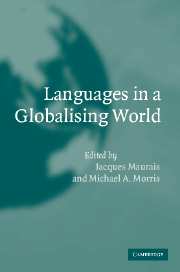Book contents
- Frontmatter
- Contents
- List of figures
- List of tables
- Notes on contributors
- Acknowledgements
- 1 Introduction
- Part I Global communication challenges
- 2 Towards a new global linguistic order?
- 3 The geostrategies of interlingualism
- 4 Language policy and linguistic theory
- 5 Babel and the market: Geostrategies for minority languages
- 6 Forecasting the fate of languages
- Part II Major areas
- Part III Languages of wider communication
- Conclusion
- Index
4 - Language policy and linguistic theory
Published online by Cambridge University Press: 18 November 2009
- Frontmatter
- Contents
- List of figures
- List of tables
- Notes on contributors
- Acknowledgements
- 1 Introduction
- Part I Global communication challenges
- 2 Towards a new global linguistic order?
- 3 The geostrategies of interlingualism
- 4 Language policy and linguistic theory
- 5 Babel and the market: Geostrategies for minority languages
- 6 Forecasting the fate of languages
- Part II Major areas
- Part III Languages of wider communication
- Conclusion
- Index
Summary
As the new millennium begins, predictions about the future of languages are proliferating. Two models that have strong political popularity – i.e. ‘free-market’ theory of unfettered capitalism and ‘green’ theory of ecological protection – correspond to two linguistic geostrategies: the race for ‘market share’ among the governments representing the major international languages and the protection of endangered languages undertaken by linguists and by those interested in linguistic human rights. On the one side are aligned the British Council and the Haut Conseil de la Francophonie; on the other, the Linguistic Society of America and MERCATOR (among many others).
These two strategies are based on many linguistic presuppositions that are rarely if ever put to the test, even by linguists: the individuality of languages, the equality of languages, the evolution of languages, etc. These notions derive, ultimately, from theories concerning what is natural, and what is not, in linguistic behaviour.
The two linguistic geostrategies mentioned above both make use of a strong theory of the so-called ‘Sapir–Whorf’ hypothesis, according to which languages impose limits on the ways in which their speakers conceptualise the world. For the free-market theorists of global language strategy, this theory would justify the domination of the great international languages as a kind of natural selection. English would be the language of capitalism, French – as was often claimed during the French Revolution – the language of republicanism, or in more recent times as the language of human values.
- Type
- Chapter
- Information
- Languages in a Globalising World , pp. 47 - 57Publisher: Cambridge University PressPrint publication year: 2003
- 30
- Cited by

